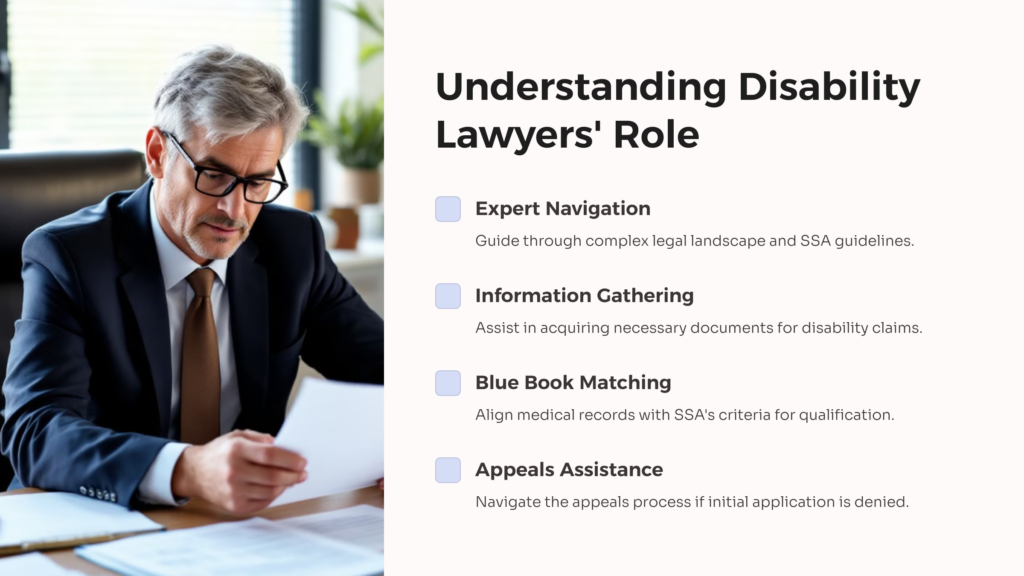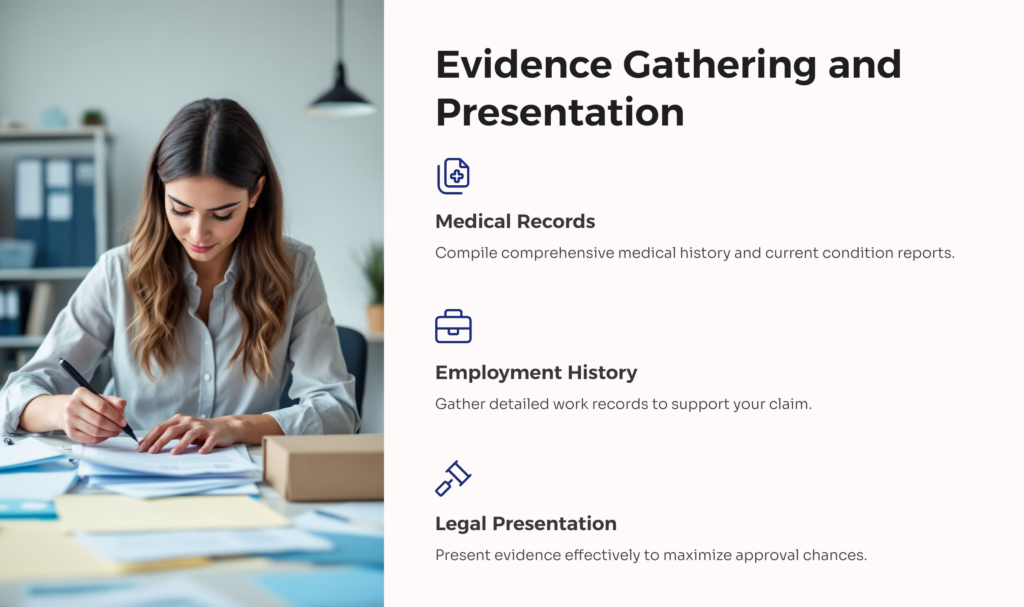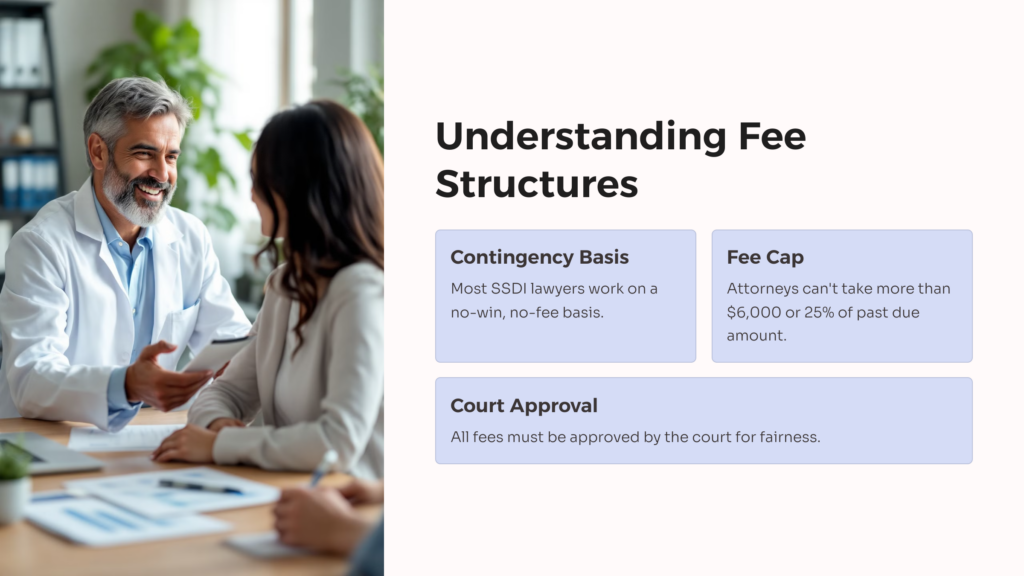Throughout life, you hope that you’ll never be injured to the point that you’ll be out of work or unable to take care of yourself. However, sometimes, accidents, whether no-fault or personal injury, and illnesses happen and it becomes necessary to file for disability benefits, such as supplemental security income and long-term disability.
The best chance of succeeding in your claim is to hire someone extremely knowledgeable in Social Security Disability law. Many offer a free case evaluation, too, so they can take a look at the particulars of your case before deciding to take it on. They also offer valuable legal advice on what you can expect from Disability Determination Services should your Social Security Disability Insurance (SSDI) claim be denied.
Allveteran can help you get started with the process, no matter what stage you’re at.
Understanding the Role of a Disability Lawyer

Before hiring a disability lawyer, it’s important to know their role. They are experts in their fields and, therefore, know how to navigate the legal landscape. When you’re looking to collect Social Security disability benefits, an attorney can help with multiple facets.
In order to become a Social Security Disability attorney, one has to have specific credentials. They have to have in-depth knowledge of personal injury, medical malpractice, and workers’ compensation, plus keep up to date on SSA guidelines. Attorneys regularly attend conferences and training sessions to stay on top of regulation changes, so they are prepared to represent you adequately.
They are beneficial in helping you acquire all of the information you’ll need to file your Social Security disability claim. This often includes medical evidence, your work history, and any other documents relevant to your claim.
They can help match your medical records to the Social Security Administration’s “Blue Book,” which lists certain criteria you must meet in order to qualify for disability. They can also arrange for expert witnesses to testify to specific elements of your disability, such as how it might impact your work and the severity of your condition.
Should your disability application be denied, your SSDI lawyer can help navigate the appeals process as well.
Evaluation of Disability Claims
When you’re filling out your disability application, it can help to have an extra set of eyes on it to make sure you’re not overlooking something important. A disability attorney can help review the claim against the criteria established by the SSA. They can also recommend medical experts and testing to have your medical condition validated. Having this help can be extremely beneficial to getting your disability claim approved.
Navigating Complex Legal Procedures
As with all government claims, filing for SSDI or SSI benefits comes with a swath of complex legal procedures. For one, there are deadlines to meet. But it’s not just one deadline — there are several along the way.
The first is the deadline for submitting your documents that prove you need the benefits. Then, if you’re denied, you have a deadline you have to meet in order to appeal the decision. There are also other steps throughout your claim process where you might need to meet specific timelines. Your attorney can help keep you on top of the game.
Gathering and Presenting Evidence

Evidence is what will make or break your case, but it’s not enough to have one piece of evidence. You need to have multiple statements, medical records, records of employment, etc, to be approved. In short, the SSA wants to have all the information it can at its fingertips to help make a determination.
Your attorney is invaluable in this respect. They know how to present the information, and more importantly, which information is likely to lead to an approval of your disability case rather than a denial.
Advocacy and Representation at Hearings

Another important element is having adequate representation at your hearings — and even during communications prior to or after hearings. Your attorney basically acts as your advocate or representative in all communications, ensuring that the process moves along in a timely manner.
Maximizing Chances of Approval
Many first-time applicants for benefits, including VA benefits, are denied. That means they have a chance to appeal. But, it’s in their best interest to do so with a qualified attorney.
Your attorney will look over your Social Security disability claim and make sure the Is are dotted and the Ts crossed. They will ask you to provide supplementary paperwork where necessary and draft a legal argument to provide at a hearing.
Appeals and Reconsiderations
If your case is denied, the next step in the legal process is to go before an administrative law judge, and doing so without an attorney can be detrimental. In many instances, less than half of those cases are subsequently approved. Compare that to when you have your lawyer representing you and the odds skirt up to just over 60%.
There are reasons for this, and one of them is that attorneys know how to present information and what information the judges are looking for. They can also challenge other information provided, such as witness testimony, if your case is unique in any respect. Plus, a qualified attorney already has experience in these types of hearings and helps reduce the amount of stress you feel, particularly if you face a difficult judge.
Then, the SSDI claimant world is actually pretty small. There are a specific number of judges that hear the cases and it’s very likely that your attorney is familiar with them and knows how to appeal the case for the best chances of success.
Sometimes, you may even have to appear in federal court and the attorney can help you prepare and address the appeals council. At this point, they will draft and present an argument, potentially challenge the administration’s position, and finally, advocate for your rights.
Understanding Fee Structures and Costs

Like all attorneys, SSDI lawyers charge fees, but the way they work is a bit different than your standard attorney. For one, there’s typically no upfront cost. Most SSDI attorneys work on a contingency-fee basis. That means, if they win your case, they get a percentage of the amount. This is normally 25% of the past due amount payable to you.
There is a cap on this as well. Attorneys cannot take more than $6,000, even if 25% of the past due amount exceeds this. The court must agree to the specific contingency fee, as well, to ensure that it’s fair to the claimant.
In some instances, there will be additional fees tacked on, particularly for cases that advance to the appeals council or federal court. However, like the contingency fee, the court has to approve these charges.
The best thing is that if the case is ultimately denied, you don’t have to pay the attorney out of pocket. There are no fees. This is a reason why lawyers will often do a free case review to make sure there is a good chance of winning before taking you on as a client.
Client-Lawyer Communication and Collaboration
Throughout the case, there will likely be multiple times you communicate with your attorney while you file for benefits. In the beginning, during the discovery process, you’ll probably meet or speak regularly while collecting the necessary paperwork and discussing the documentation and evidence you need to back up your claim.
Once the paperwork is filed, it’s a wait-and-see game while the SSA decides. Should it be approved and back pay issued, you will have basically an open-and-shut case. Most likely, however, you will end up meeting a few times if the claim is denied — which many are at first, like we previously mentioned — to discuss the next steps in the case.
The next steps might be even more discovery, or a meeting with an expert witness to discuss your particulars. However, your attorney should always keep you apprised of the situation and status of the case, whether it’s in limbo, denied, or heading toward appeal.
All of the communication between you and your SSDI attorney is covered by client-attorney privilege. They cannot reveal any information that you share with them, per law. You can rest assured your medical records and other sensitive data are in good hands.
Success Stories and Testimonials
Conclusion
When filing a Social Security Disability claim, it’s beneficial to have an attorney qualified in disability law to help guide you through the process. They are an invaluable asset from the beginning where you fill out the paperwork to the end, whether that takes one or more appeals.
Because they do a case review before even bringing you on as a client and validate that you really do have a case, there is no upfront financial risk. The attorney takes all of that on. Hiring a lawyer is a smart way to ensure you get the Veteran benefits you deserve. If you’re ready to take the leap and hire an attorney today, it’s easy to get started here.
 AllVeteran.com Advisors
AllVeteran.com Advisors
With expertise spanning local, state, and federal benefit programs, our team is dedicated to guiding individuals towards the perfect program tailored to their unique circumstances.


















